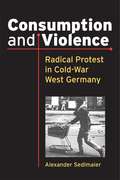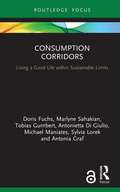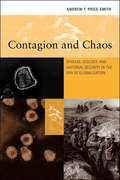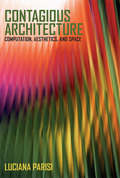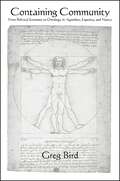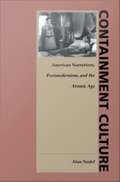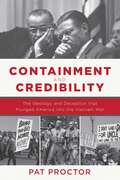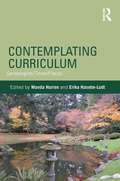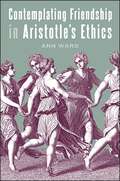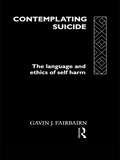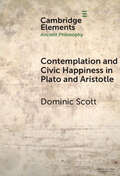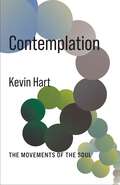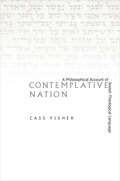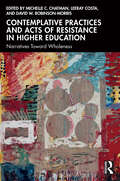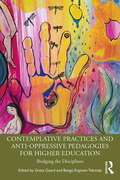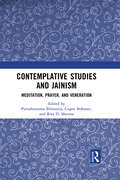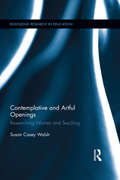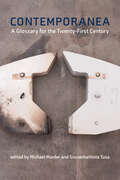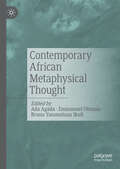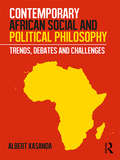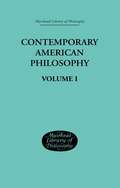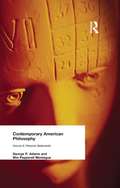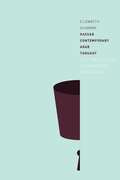- Table View
- List View
Consumption And Violence: Radical Protest In Cold-war West Germany
by Alexander SedlmaierCombining the tools of political, social, cultural, and intellectual history, Consumption and Violence: Radical Protest in Cold-War West Germany explores strategies of legitimization developed by advocates of militant resistance to certain manifestations of consumer capitalism. The book contributes to a more sober evaluation of West German protest movements, not just terrorism, as it refrains from emotional and moral judgments, but takes the protesters' approaches seriously, which, regarding consumer society, had a rational core. Political violence is not presented as the result of individual shortcomings, but emerges in relation to major societal changes, i. e. , the unprecedented growth of consumption. This new perspective sheds important light on violence and radical protest in post-war Germany, as previous books have failed to examine to what extent these forms of resistance should be regarded as reactions to changing regimes of provision. Continuing the recently growing interest in the interdependence of countercultures and consumer society, the focus on violence gives the argument a unique twist, making the book thought-provoking and engaging.
Consumption Corridors: Living a Good Life within Sustainable Limits (Routledge Focus on Environment and Sustainability)
by Antonia Graf Sylvia Lorek Marlyne Sahakian Antonietta Di Giulio Doris Fuchs Michael Maniates Tobias GumbertConsumption Corridors: Living a Good Life within Sustainable Limits explores how to enhance peoples’ chances to live a good life in a world of ecological and social limits. Rejecting familiar recitations of problems of ecological decline and planetary boundaries, this compact book instead offers a spirited explication of what everyone desires: a good life. Fundamental concepts of the good life are explained and explored, as are forces that threaten the good life for all. The remedy, says the book’s seven international authors, lies with the concept of consumption corridors, enabled by mechanisms of citizen engagement and deliberative democracy. Across five concise chapters, readers are invited into conversation about how wellbeing can be enriched by social change that joins "needs satisfaction" with consumerist restraint, social justice, and environmental sustainability. In this endeavour, lower limits of consumption that ensure minimal needs satisfaction for all are important, and enjoy ample precedent. But upper limits to consumption, argue the authors, are equally essential, and attainable, especially in those domains where limits enhance rather than undermine essential freedoms. This book will be of great interest to students and scholars in the social sciences and humanities, and environmental and sustainability studies, as well as to community activists and the general public.
Contagion and Chaos: Disease, Ecology, and National Security in the Era of Globalization
by Andrew T. Price-SmithAn analysis of infectious disease as a threat to national security that examines the destabilizing effects of the 1918 Spanish Flu pandemic, HIV/AIDS in sub-Saharan Africa, SARS, and Mad Cow Disease.Historians from Thucydides to William McNeill have pointed to the connections between disease and civil society. Political scientists have investigated the relationship of public health to governance, introducing the concept of health security. In Contagion and Chaos, Andrew Price-Smith offers the most comprehensive examination yet of disease through the lens of national security. Extending the analysis presented in his earlier book The Health of Nations, Price-Smith argues that epidemic disease represents a direct threat to the power of a state, eroding prosperity and destabilizing both its internal politics and its relationships with other states. He contends that the danger of an infectious pathogen to national security depends on lethality, transmissability, fear, and economic damage. Moreover, warfare and ecological change contribute to the spread of disease and act as “disease amplifiers.” Price-Smith presents a series of case studies to illustrate his argument: the Spanish influenza pandemic of 1918-19 (about which he advances the controversial claim that the epidemic contributed to the defeat of Germany and Austria); HIV/AIDS in sub-Saharan Africa (he contrasts the worst-case scenario of Zimbabwe with the more stable Botswana); bovine spongiform encephalopathy (also known as mad cow disease); and the SARS contagion of 2002-03. Emerging infectious disease continues to present a threat to national and international security, Price-Smith argues, and globalization and ecological change only accelerate the danger.
Contagious Architecture: Computation, Aesthetics, and Space (Technologies of Lived Abstraction)
by Luciana ParisiA proposal that algorithms are not simply instructions to be performed but thinking entities that construct digital spatio-temporalities.In Contagious Architecture, Luciana Parisi offers a philosophical inquiry into the status of the algorithm in architectural and interaction design. Her thesis is that algorithmic computation is not simply an abstract mathematical tool but constitutes a mode of thought in its own right, in that its operation extends into forms of abstraction that lie beyond direct human cognition and control. These include modes of infinity, contingency, and indeterminacy, as well as incomputable quantities underlying the iterative process of algorithmic processing. The main philosophical source for the project is Alfred North Whitehead, whose process philosophy is specifically designed to provide a vocabulary for “modes of thought” exhibiting various degrees of autonomy from human agency even as they are mobilized by it. Because algorithmic processing lies at the heart of the design practices now reshaping our world—from the physical spaces of our built environment to the networked spaces of digital culture—the nature of algorithmic thought is a topic of pressing importance that reraises questions of control and, ultimately, power. Contagious Architecture revisits cybernetic theories of control and information theory's notion of the incomputable in light of this rethinking of the role of algorithmic thought. Informed by recent debates in political and cultural theory around the changing landscape of power, it links the nature of abstraction to a new theory of power adequate to the complexities of the digital world.
Containing Community: From Political Economy to Ontology in Agamben, Esposito, and Nancy (SUNY series in Contemporary Italian Philosophy)
by Greg BirdWinner of the 2017 Symposium Book Award presented by Symposium: Canadian Journal of Continental PhilosophyCommunity has been both celebrated and demonized as a fortress that shelters and defends its members from being exposed to difference. Instead of abandoning community as an antiquated model of relationships that is ill suited for our globalized world, this book turns to the writings of Giorgio Agamben, Roberto Esposito, and Jean-Luc Nancy in search for ways to rethink community in an open and inclusive manner. Greg Bird argues that a central piece of this task is found in how each philosopher rearticulates community not as something that is proper to those who belong and improper to those who are excluded or where inclusion is based on one's share in common property. We must return to the forgotten dimension of sharing, not as a sharing of things that we can contain and own, but as a process that divides us up and shares us out in community with one another. This book traces this problem through a wide array of fields ranging from biopolitics, communitarianism, existentialism, phenomenology, political economy, radical philosophy, and social theory.
Containment Culture: American Narratives, Postmodernism, and the Atomic Age
by Alan NadelAlan Nadel provides a unique analysis of the rise of American postmodernism by viewing it as a breakdown in Cold War cultural narratives of containment. These narratives, which embodied an American postwar foreign policy charged with checking the spread of Communism, also operated, Nadel argues, within a wide spectrum of cultural life in the United States to contain atomic secrets, sexual license, gender roles, nuclear energy, and artistic expression. Because these narratives were deployed in films, books, and magazines at a time when American culture was for the first time able to dominate global entertainment and capitalize on global production, containment became one of the most widely disseminated and highly privileged national narratives in history. Examining a broad sweep of American culture, from the work of George Kennan to Playboy Magazine, from the movies of Doris Day and Walt Disney to those of Cecil B. DeMille and Alfred Hitchcock, from James Bond to Holden Caulfield, Nadel discloses the remarkable pervasiveness of the containment narrative. Drawing subtly on insights provided by contemporary theorists, including Baudrillard, Foucault, Jameson, Sedgwick, Certeau, and Hayden White, he situates the rhetoric of the Cold War within a gendered narrative powered by the unspoken potency of the atom. He then traces the breakdown of this discourse of containment through such events as the Bay of Pigs invasion and the Free Speech Movement at Berkeley, and ties its collapse to the onset of American postmodernism, typified by works such as Catch-22 and The Man Who Shot Liberty Valence. An important work of cultural criticism, Containment Culture links atomic power with postmodernism and postwar politics, and shows how a multifarious national policy can become part of a nation's cultural agenda and a source of meaning for its citizenry.
Containment and Credibility: The Ideology and Deception that Plunged America into the Vietnam War
by Pat ProctorIs it possible that a president and his administration would purposefully mislead the American public so that they could commit the United States to a war that is not theirs to fight? Anyone with even a remote memory of the phrase "weapons of mass destruction” probably finds such a question naive. On the eve of the fiftieth anniversary of the Vietnam War, those with longer memories would consider the unquestioning acceptance of Saddam Hussein’s "gathering threat” even more naive. Providing historical context that highlights how the decision to use force is made, as well as how it is "sold,” Containment and Credibility explores how the half-truths and outright lies of both the Johnson and Nixon administrations brought us into a conflict that cost more than fifty thousand American lives over eight years. As we consider how best to confront the growing threat of ISIS, it is increasingly important for the public to understand how we were convinced to go to war in the past. In the 1960s, the domino theory warning of the spread of communism provided the rationale for war, followed by the deception of the Gulf of Tonkin Incident and the resulting resolution that essentially gave LBJ a blank check. This book will show how this deception ultimately led to the unraveling of the Johnson presidency and will explore the credibility gap that led to the public political debate of that time. Containment and Credibility applies the lessons of the sixties to today’s similar debates regarding military involvement. Skyhorse Publishing, as well as our Arcade imprint, are proud to publish a broad range of books for readers interested in history--books about World War II, the Third Reich, Hitler and his henchmen, the JFK assassination, conspiracies, the American Civil War, the American Revolution, gladiators, Vikings, ancient Rome, medieval times, the old West, and much more. While not every title we publish becomes a New York Times bestseller or a national bestseller, we are committed to books on subjects that are sometimes overlooked and to authors whose work might not otherwise find a home.
Contemplating Curriculum: Genealogies/Times/Places (Studies in Curriculum Theory Series)
by Erika Hasebe-Ludt Wanda HurrenContemplating Curriculum takes up world-renowned curricular scholar, teacher, and mentor Ted T. Aoki’s invitation to contemplate where curriculum scholars situate themselves in their work. At the same time it probes into the historical and present conditions that make it both possible and impossible to attend to this work in classrooms and communities in mindful, embodied, and aesthetic ways, both locally and globally. The book offers a strong representative sampling of contemporary thinking in the field with a focus on contemplative approaches to curriculum. In their theorizing, contributors call on literary and other mixed-genre formats, such as creative nonfiction, poetry, and essay. They acknowledge the importance of intergenerational dialogue and recognize the importance of time and place in curricular, pedagogical, and personal sense-making. These written and visual texts invite contemplation on notions of curriculum, both planned and lived, in an Aokian spirit of intertextuality.
Contemplating Friendship in Aristotle's Ethics (SUNY series in Ancient Greek Philosophy)
by Ann WardIn this book, Ann Ward explores Aristotle's Nicomachean Ethics, focusing on the progressive structure of the argument. Aristotle begins by giving an account of moral virtue from the perspective of the moral agent, only to find that the account itself highlights fundamental tensions within the virtues that push the moral agent into the realm of intellectual virtue. However, the existence of an intellectual realm separate from the moral realm can lead to lack of self-restraint. Aristotle, Ward argues, locates political philosophy and the experience of friendship as possible solutions to the problem of lack of self-restraint, since political philosophy thinks about the human things in a universal way, and friendship grounds the pursuit of the good which is happiness understood as contemplation. Ward concludes that Aristotle's philosophy of friendship points to the embodied intellect of timocratic friends and mothers in their activity of mothering as engaging in the highest form of contemplation and thus living the happiest life.
Contemplating Suicide: The Language and Ethics of Self-Harm (Social Ethics and Policy)
by Gavin Fairbairn Gavin J FairbairnSuicide is devastating. It is an assault on our ideas of what living is about. In Contemplating Suicide Gavin Fairbairn takes fresh look at suicidal self harm. His view is distinctive in not emphasising external facts: the presence or absence of a corpse, along with evidence that the person who has become a corpse, intended to do so. It emphasises the intentions that the person had in acting, rather than the consequences that follow from those actions. Much of the book is devoted to an attempt to construct a natural history of suicidal self harm and to examine some of the ethical issues that it raises. Fairbairn sets his philosophical reflections against a background of practical experience in the caring professions and uses a storytelling approach in offering a critique of the current language of self harm along with some new ways of thinking. Among other things he offers cogent reasons for abandoning the mindless use of terms such as attempted suicide and parasuicide , and introduces a number of new terms including cosmic roulette , which he uses to describe a family of human acts in which people gamble with their lives. By elaborating a richer model of suicidal self harm than most philosophers and most practitioners of caring professions currently inhabit, Fairbairn has contributed to the development of understanding in this area. Among other things a richer model and vocabulary may reduce the likelihood that those who come into contact with suicidal self harm, will believe that familiarity with the physical facts of the matter - the actions of the suicider and the presence or absence of a corpse - is always sufficient to justify a definite conclusion about the nature of the self harming act.
Contemplation and Society in Plato and Aristotle (Elements in Ancient Philosophy)
by Dominic ScottThis Element concerns the civic value of contemplation in Plato and Aristotle: how does intellectual contemplation contribute to the happiness of the ideal state? The texts discussed include the Republic, the Nicomachean Ethics and the Politics, works in which contemplation is viewed from a political angle. The Element concludes that in the Republic contemplation has purely instrumental value, whereas in the Politics and Nicomachean Ethics it has purely intrinsic value. To do justice to the complexity of the issues involved, the author addresses a broader question about the nature of civic happiness: whether it is merely the aggregate of individual happiness or an organic quality that arises from the structure of the state. Answering this question has implications for how contemplation contributes to civic happiness. The Element also discusses how many citizens Plato and Aristotle expected to be engaged in contemplation in the ideal state.
Contemplation: The Movements of the Soul (No Limits)
by Kevin HartWhat is contemplation? How is it distinct from meditation? Is contemplation essentially religious or mystical? What should one contemplate, and how? Are there different styles of contemplation, and why should one practice them? Ought we try to lead more contemplative lives?This book offers a philosophical introduction to the theory and practice of contemplation. Kevin Hart examines a variety of religious, aesthetic, and philosophical notions, shedding light on the singular qualities of contemplation. This book spans topics including the spiritual exercises of the ancient Greeks, overlooked aspects of Christian spirituality, and aesthetic contemplation of nature and art. Contemplation ranges from ancient thinkers such as Aristotle, Plato, and Plotinus to Aquinas and other medieval theologians as well as modern philosophers like Kant, Husserl, and Wittgenstein. Though focused on Christianity, it also considers contemplation in other religious traditions, among them Buddhism, Hinduism, Judaism, Islam, and Paganism.Concise and comprehensive, this book provides both religious and nonreligious readers with a foundational understanding of the history and nature of contemplation as well as the benefits of practicing it.
Contemplative Nation: A Philosophical Account of Jewish Theological Language
by Cass FisherContemplative Nation challenges the long-standing view that theology is not a vital part of the Jewish tradition. For political and philosophical reasons, both scholars of Judaism and Jewish thinkers have sought to minimize the role of theology in Judaism. This book constructs a new model for understanding Jewish theological language that emphasizes the central role of theological reflection in Judaism and the close relationship between theological reflection and religious practice in the Jewish tradition. Drawing on diverse philosophical resources, Fisher's model of Jewish theology embraces the multiple forms and functions of Jewish theological language. Fisher demonstrates the utility of this model by undertaking close readings of an early rabbinic commentary on the book of Exodus (Mekhilta of Rabbi Ishmael ) and a work of modern philosophical theology (Franz Rosenzweig's The Star of Redemption). These readings advance the discussion of theology in rabbinics and modern Jewish thought and provide resources for constructive Jewish theology.
Contemplative Practices and Acts of Resistance in Higher Education: Narratives Toward Wholeness
by Michelle C. Chatman LeeRay Costa Robinson-Morris, David W.The contributors to this volume – educators, student affairs practitioners, and higher education staff – heartfully share a broad range of contemplative practices and acts of resistance used within the confines of shattered systems and institutions for themselves, their colleagues, and their students. The narratives in this volume broadly imagine, inspire, recount, and guide readers toward the fullness of their humanity and wholeness within institutions of higher education. At the same time, these accounts navigate the operational realities of daunting demands on the mind, body, and spirit, the growing turbulence of working on higher education campuses across the country, and a sense of urgency toward collective life affirmation within modern higher education institutions. Each chapter features critical framing of a concept, personal stories of this concept in action, and descriptions of contemplative practices for readers to use in their own contexts. Together, chapter authors demonstrate what it means to be a contemplative practitioner attentive to issues of power, racism, and marginalization in higher education today. With a deep breath and mindful awareness, this book invites faculty and staff at colleges and universities on a transformational journey with the contributors toward fullness in pursuit of becoming whole and inspiring change.
Contemplative Practices and Anti-Oppressive Pedagogies for Higher Education: Bridging the Disciplines
by Greta Gaard Bengü Ergüner-TekinalpThis volume explores mindfulness and other contemplative approaches as strategic tools for cultivating anti-oppressive pedagogies in higher education. Research confirms that simply providing students with evidence and narratives of economic, social, and environmental injustices proves insufficient in developing awareness and eliciting responses of empathy, solidarity, and a desire to act for change. From the environmental humanities to the environmental sciences, legal studies, psychology, and counseling, educators from a range of geographical and disciplinary standpoints describe their research-based mindfulness pedagogies. Chapters explore how to interrupt and interrogate oppression through contemplative teaching tools, assignments, and strategies that create greater awareness and facilitate deeper engagement with learning contents, contexts, and communities. Providing a framework that facilitates awareness of the links between historic and current oppression, self-identity, and trauma, and creating a transformative learning experience through mindfulness, this book is a must-read for faculty and educators interested in intersections of mindfulness, contemplative pedagogies, and anti-oppression.
Contemplative Studies & Jainism: Meditation, Prayer, and Veneration
by Purushottama Bilimoria Rita D. Sherma Cogen BohanecThis volume is one of the first wide-ranging academic surveys of the major types and categories of Jain praxis. It covers a breadth of scholarly viewpoints that reflect both the variegation in terms of spiritual practices within the Jain traditions as well as the Jain hermeneutical perspectives, which are employed in understanding its rich diversity. The volume illustrates a complex and nuanced understanding of the multifaceted category of Jain religious thought and practice. It offers a rare intrareligious dialogue within Jain traditions and at the same time, significantly broadens and enriches the field of Contemplative Studies to include an ancient, ascetic, non-theistic tradition. Meditation, yoga, ritual, prayer are common to all Indic spiritual traditions. By investigating these diverse, yet overlapping, categories one might obtain a sophisticated understanding of religious traditions that originally emerged in South Asia. Essays in this book demonstrate how these forms of praxis in Jainism, and the philosophies that anchor those practices, are interrelated, and when brought into dialogue, help to foster new tools for understanding a complex and variegated tradition such as Jain Dharma. This book will be useful to scholars and researchers of religious and theological studies, contemplative studies, Jain studies, Hindu studies, consciousness studies, Yoga studies, Indian philosophy and religion, sociology of religion, philosophy of religion, comparative religion, and South Asian studies, as well as general readers interested in the topic.
Contemplative and Artful Openings: Researching Women and Teaching (Routledge Research in Education #193)
by Susan Casey WalshHighlighting an arts-based inquiry process that involves contemplation, mindful awareness, and artful writing, this book explores women’s difficult experiences in teaching. It weaves a strong autobiographical thread with artifacts from several research projects with female teachers. By linking innovative approaches to research that involve visual images and poetic writing with feminist poststructuralist theories and Buddhist-inspired practices, Walsh offers new understandings about what it means to be critical in research and teaching—and also what transformation, both social and personal, might entail.
Contemporanea: A Glossary for the Twenty-First Century
by Michael Marder Giovanbattista TusaA groundbreaking, multidisciplinary collection that rethinks our present moment and anticipates the key concepts that will shape and direct the twenty-first century.Contemporanea is a nascent lexicon for the twenty-first century edited by seasoned philosophers and authors Michael Marder and Giovanbattista Tusa. The collection showcases perspectives from a range of noteworthy thinkers in philosophy, ecology, and cultural studies, as well as artists, from across the globe, including Slavoj Zizek, Timothy Morton, Denise Ferreira Da Silva, and Vandana Shiva, who each describe what they anticipate will be the concepts shaping the trajectory of this century—everything from the world state to the nuclear taboo, automation to Teslaism, plant sexuality to arachnomancy, and ecotrauma to resonances, to name a few.This century, as the editors explain, has to date grounded itself in the debris of the preceding century, whose revolutions and struggles failed to transform our time: post-colonialism, post-fascism, and post-liberalism have morphed into neocolonialism, neoliberalism, and neofascism, often combined in a previously unimaginable mix. And, just as the political developments at the beginning of the twenty-first century revived and reshuffled those of the preceding epoch, so too have philosophical trends sought to breathe fresh life into the stillborn -isms of the past—realism, vitalism, logicism, materialism, empiricism, criticism—adding the adjective &“new&” and sometimes &“radical&” before them. To articulate a different future, another language is needed. And, to develop another language, one needs to develop fresh concepts, including the concepts proposed in this collection.ContributorsMieke Bal, Claudia Baracchi, Amanda Boetzkes, Erik Bordeleau, Anita Chari, Emanuele Coccia, Valentina Desideri, Roberto Esposito, Filipe Ferreira, Denise Ferreira da Silva, Claire Fontaine, Graham Harman, Yogi Hale Hendlin, Ranjit Hoskote, Cymene Howe, Daniel Innerarity, Joela Jacobs, Ken Kawashima, Sabu Kohso, Bogna Konior, Brandon LaBelle, Anna Longo, Artemy Magun, Michael Marder, Michael Marder, Jason Bahbak Mohaghegh, Timothy Morton, Mycelium, Jean-Luc Nancy, Bahar Noorizadeh, Kelly Oliver, Uriel Orlow, Richard Polt, Marcia Sá Cavalcante Schuback, Tomás Saraceno, Vandana Shiva, Anton Tarasyuk, Anaïs Tondeur, Giovanbattista Tusa, Sjoerd van Tuinen, Santiago Zabala, Zahi Zalloua, Slavoj Žižek
Contemporary African Metaphysical Thought
by Ada Agada Emmanuel Ofuasia Bruno Yammeluan IkuliAfrican metaphysics question a variety of issues, ranging from the nature of fundamental reality to the meaning of human existence. African philosophers have introduced groundbreaking metaphysical theories in response to these metaphysical issues and questions. These theories provide uniquely African perspectives that challenge philosophers to look inwards and produce globally competitive ideas instead of exoticising traditional African worldviews for the intellectual entertainment of a non-African audience. This volume advances the field of African metaphysics by critically engaging with key metaphysical ideas and concepts developed by African metaphysical thinkers. The chapters contributed in this volume by established researchers and promising young scholars challenge and modify existing metaphysical theories while proposing novel theories that shape debates in the field.
Contemporary African Social and Political Philosophy: Trends, Debates and Challenges
by Albert KasandaThis book explores what constitutes contemporary African social and political philosophy with regard to its meaning, aims, sources, and relevance for today’s Africa. Kasanda denounces conventional approaches considering these either as a subcategory of general philosophy or as the ideological attempts of individual African leaders and professional philosophers, such as Nkrumah, Nyerere, Senghor, Fanon, Hountondji and Towa. On the contrary, Kasanda defines contemporary African social and political philosophy as an inclusive reflection of African communities with regard to power and equitable modes of social and political organization in order to promote human excellence for everyone. This perspective also includes the criticism of social and political concepts in use within African communities. The author postulates that contemporary African social and political philosophy relies on the legacy of precolonial African societies, as well as on the contribution of the diaspora throughout the world. Contemporary African social and political philosophy is rooted in the daily lives of African people, and it expresses itself through multiple modalities including, for example, art, religion, literature, music and the policy of urbanization of African cities. This book sheds new light on debates concerning topics such as ethnophilosophy, negritude, pan-Africanism, democracy, African civil society, African cultures, and globalization. It aims to ward off the lethargy that strikes African social and political philosophy, taking a renewed and critical approach.
Contemporary American Philosophy: Personal Statements Volume I (Muirhead Library Of Philosophy Ser.)
by Adams, George P and Montague, Wm PepperellFirst published in 2002. Routledge is an imprint of Taylor & Francis, an informa company.
Contemporary American Philosophy: Personal Statements Volume II (Muirhead Library Of Philosophy Ser.)
by Adams, George P and Montague, Wm PepperellFirst published in 2002. Routledge is an imprint of Taylor & Francis, an informa company.
Contemporary Arab Thought: Cultural Critique in Comparative Perspective
by Elizabeth Suzanne KassabDuring the second half of the twentieth century, the Arab intellectual and political scene polarized between a search for totalizing doctrines-nationalist, Marxist, and religious-and radical critique. Arab thinkers were reacting to the disenchanting experience of postindependence Arab states, as well as to authoritarianism, intolerance, and failed development. They were also responding to successive defeats by Israel, humiliation, and injustice. The first book to take stock of these critical responses, this volume illuminates the relationship between cultural and political critique in the work of major Arab thinkers, and it connects Arab debates on cultural malaise, identity, and authenticity to the postcolonial issues of Latin America and Africa, revealing the shared struggles of different regions and various Arab concerns.
Contemporary Arab Thought: Cultural Critique in Comparative Perspective
by Elizabeth Suzanne KassabDuring the second half of the twentieth century, the Arab intellectual and political scene polarized between a search for totalizing doctrines—nationalist, Marxist, and religious—and radical critique. Arab thinkers were reacting to the disenchanting experience of postindependence Arab states, as well as to authoritarianism, intolerance, and failed development. They were also responding to successive defeats by Israel, humiliation, and injustice. The first book to take stock of these critical responses, this volume illuminates the relationship between cultural and political critique in the work of major Arab thinkers, and it connects Arab debates on cultural malaise, identity, and authenticity to the postcolonial issues of Latin America and Africa, revealing the shared struggles of different regions and various Arab concerns.
Contemporary Aristotelian Metaphysics
by Tuomas E. TahkoAristotelian (or neo-Aristotelian) metaphysics is currently undergoing something of a renaissance. This volume brings together fourteen new essays from leading philosophers who are sympathetic to this conception of metaphysics, which takes its cue from the idea that metaphysics is the first philosophy. The primary input from Aristotle is methodological, but many themes familiar from his metaphysics will be discussed, including ontological categories, the role and interpretation of the existential quantifier, essence, substance, natural kinds, powers, potential, and the development of life. The volume mounts a strong challenge to the type of ontological deflationism which has recently gained a strong foothold in analytic metaphysics. It will be a useful resource for scholars and advanced students who are interested in the foundations and development of philosophy.
